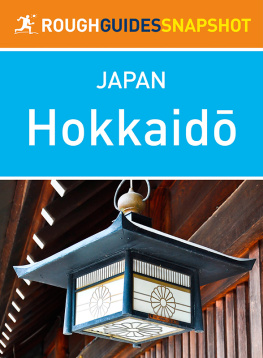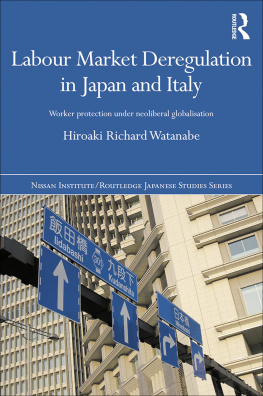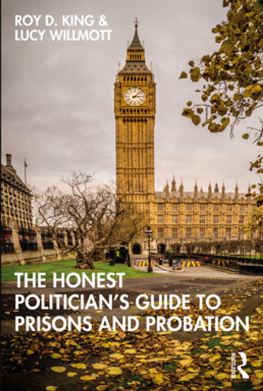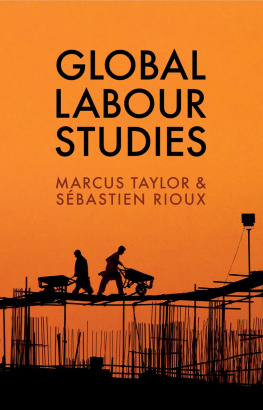
Prisons and Forced Labour in Japan
Prisons and Forced Labour in Japan examines the local, national and international significance of convict labour during the colonization of Hokkaido between 1881 and 1894 and the building of the Japanese empire.
Based on the analysis of archival sources such as prison yearbooks and letters, as well as other eyewitness accounts, this book uses a framework of global prison studies to trace the historical origins of prisons and forced labour in early modern Japan. It explores the institutionalization of convict labour on Hokkaido against the backdrop of political uprisings during the Meiji period. In so doing, it argues that although Japan tried to implement Western ideas of the prison as a total institution, the concrete reality of the prison differed from theoretical concepts. In particular, the boundaries between prisons and their environment were not clearly marked during the colonization of Hokkaido.
This book provides an important contribution to the historiography of Meiji Japan and Hokkaido and to the global study of prisons and forced labour in general. As such, it will be useful to students and scholars of Japanese, Asian and labour history.
Pia Maria Jolliffe is a Research and Teaching Associate at the Nissan Institute of Japanese Studies and a Research Fellow at Blackfriars Hall, University of Oxford, UK. She is the author of Learning, Migration and Intergenerational Relations: The Karen and the Gift of Education (2016).
Routledge Focus on Asia
The Abe Administration and Rise of the Prime Ministerial Executive
Aurelia George Mulgan
Heritage Revitalisation for Tourism in Hong Kong
The Role of Interpretative Planning
Chris White
Prisons and Forced Labour in Japan
The Colonization of Hokkaido, 18811894
Pia Maria Jolliffe
Prisons and Forced Labour in Japan
The Colonization of Hokkaido, 18811894
Pia Maria Jolliffe
First published 2019
by Routledge
2 Park Square, Milton Park, Abingdon, Oxon OX14 4RN
and by Routledge
52 Vanderbilt Avenue, New York, NY 10017
Routledge is an imprint of the Taylor & Francis Group, an informa business
2019 Pia Maria Jolliffe
The right of Pia Maria Jolliffe to be identified as author of this work has been asserted by her in accordance with sections 77 and 78 of the Copyright, Designs and Patents Act 1988.
All rights reserved. No part of this book may be reprinted or reproduced or utilised in any form or by any electronic, mechanical, or other means, now known or hereafter invented, including photocopying and recording, or in any information storage or retrieval system, without permission in writing from the publishers.
Trademark notice: Product or corporate names may be trademarks or registered trademarks, and are used only for identification and explanation without intent to infringe.
British Library Cataloguing-in-Publication Data
A catalogue record for this book is available from the British Library
Library of Congress Cataloging-in-Publication Data
Names: Jolliffe, Pia, author.
Title: Prisons and forced labour in Japan : the colonization of Hokkaido, 18811894 / Pia Maria Jolliffe.
Description: Abingdon, Oxon ; New York, NY : Routledge, 2019. | Series: Routledge focus on Asia ; 3 | Includes bibliographical references and index.
Identifiers: LCCN 2018033056 | ISBN 9780815383208 (hardback) | ISBN 9781351206358 (ebook) | ISBN 9781351206334 (epub) | ISBN 9781351206327 (mobipocket encrypted)
Subjects: LCSH: Forced laborJapanHokkaidoHistory 19th century. | Convict laborJapanHokkaidoHistory19th century. | PrisonsJapanHokkaidoHistory19th century. | Hokkaido (Japan)Colonization.
Classification: LCC HD4875.J3 J65 2019 | DDC 331.11/730952409034dc23
LC record available at https://lccn.loc.gov/2018033056
ISBN: 978-0-8153-8320-8 (hbk)
ISBN: 978-1-351-20635-8 (ebk)
Typeset in Times New Roman
by Apex CoVantage, LLC
To William, Joseph and Teresa
All Japanese terms have been transcribed according to the Hepburn romanization system. Japanese names of persons are given in the usual Japanese order: surname, then first name. Translations from foreign language texts and unit conversions are, unless otherwise noted, my own.
The original wish to carry out a study on the topic of prisons and forced labour in Japan came to life while I was doing an academic exchange year at Yokohama Shiritsu Daigaku (Yokohama City University), made possible by a Joint Study Scholarship from the University of Vienna. It was during this year that I visited Abashiri, a small city at the Sea of Okhotsk. Abashiri is known in Japan as a prison town. A prison museum provides visitors with information on the history and the stark living conditions of the Meiji-era prison. I was impressed by this history and decided to draft an in-depth research project on the topic of prison and forced labour in early modern Japan.
At the Institute for East Asia Studies at the University of Vienna, Sepp Linhart supervised my study with great interest from the very beginning, supporting me by asking important questions on the topic and giving me tips on the relevant literature. Stimulating questions from Wolfram Manzenreiter, Ina Hein, Ingrid Getreuer-Kargl, Roland Domenig and Bernhard Seidl, as well as their students, also contributed to the development of this work. I am particularly grateful for their invitation to present and discuss my work in the AAJ (Akademischer Arbeitskreis Japan) lecture series.
In the United States, Daniel Botsman (Yale University) generously shared his research expertise with me.
I gratefully acknowledge the Great Britain Sasakawa Foundation who offered me a grant to revisit Hokkaido for follow-up research at Hokkaido Daigaku (University of Hokkaido) in Sapporo. There, I benefitted from discussions with Philip Seaton and his students. I also thank the German Institute for Japanese Studies (DIJ Tokyo) for the opportunity to present my work to the DIJ History & Humanities Study Group.
At the Nissan Institute of Japanese Studies, University of Oxford, I wish to thank Sho Konishi, Alice Freeman and the members of the Japanese History Workshop for their collegial friendship, questions and critical remarks on my work-in-progress. I am grateful to Maro Dotulong for designing the maps in this study, to Chinami Oka and Kimiko Kuga for their research assistance and to Michelle Chew for proofreading the manuscript. Of course, all remaining mistakes are mine. Hugh Whittaker and Jane Baker supported me in the planning of this research, and Roger Goodman encouraged me to submit the manuscript to Routledge where Stephanie Rogers and Georgina Bishop provided helpful editorial assistance. I also express gratitude to three anonymous reviewers who commented on early versions of this book.
My family in Austria and the United Kingdom have been very supportive throughout this research. My parents Franz and Maria Vogler encouraged me from early on in my studies about Japan. I also thank my husband William Jolliffe for supporting my research on Japanese history and for travelling with me and our children to Japan. I am grateful for the joy their loving company adds to my work at home and abroad.









